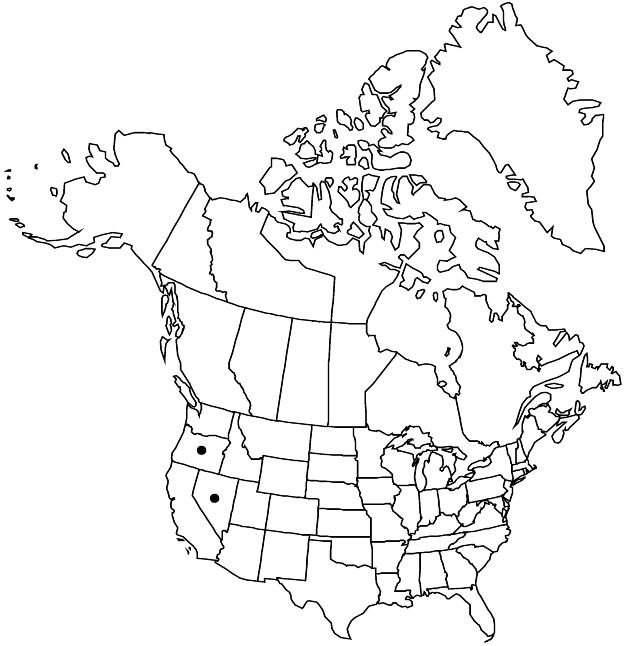Difference between revisions of "Ivesia rhypara"
Madroño 24: 224, fig. 1. 1977.
FNA>Volume Importer |
FNA>Volume Importer |
||
| Line 28: | Line 28: | ||
|distribution=w United States. | |distribution=w United States. | ||
|discussion=<p>Varieties 2 (2 in the flora).</p><!-- | |discussion=<p>Varieties 2 (2 in the flora).</p><!-- | ||
| − | --><p><i>Ivesia rhypara</i> forms densely hairy mats or mounds on isolated edaphic sites in the northern Great Basin. Only one of the widely disjunct population clusters is recognized as a distinct variety; the others have general differences in gestalt, but no significant distinctions have been determined (B. Ertter 1989). Isozyme analysis likewise does not show significant differences (T. Kaye et al., unpubl., BLM and Oregon Dept. of Agriculture, 1991). Reproductive studies by D. Wiens (pers. comm.) show low seed set (ca. 5% in < | + | --><p><i>Ivesia rhypara</i> forms densely hairy mats or mounds on isolated edaphic sites in the northern Great Basin. Only one of the widely disjunct population clusters is recognized as a distinct variety; the others have general differences in gestalt, but no significant distinctions have been determined (B. Ertter 1989). Isozyme analysis likewise does not show significant differences (T. Kaye et al., unpubl., BLM and Oregon Dept. of Agriculture, 1991). Reproductive studies by D. Wiens (pers. comm.) show low seed set (ca. 5% in <i></i>var.<i> rhypara</i>, somewhat higher in <i></i>var.<i> shellyi</i>), possibly indicating a deleterious genetic load.</p> |
|tables= | |tables= | ||
|references= | |references= | ||
| Line 51: | Line 51: | ||
-->{{#Taxon: | -->{{#Taxon: | ||
name=Ivesia rhypara | name=Ivesia rhypara | ||
| − | |||
|authority=Ertter & Reveal | |authority=Ertter & Reveal | ||
|rank=species | |rank=species | ||
| Line 63: | Line 62: | ||
|publication year=1977 | |publication year=1977 | ||
|special status=Conservation concern;Endemic | |special status=Conservation concern;Endemic | ||
| − | |source xml=https://jpend@bitbucket.org/aafc-mbb/fna-data-curation.git/src/ | + | |source xml=https://jpend@bitbucket.org/aafc-mbb/fna-data-curation.git/src/f50eec43f223ca0e34566be0b046453a0960e173/coarse_grained_fna_xml/V9/V9_346.xml |
|subfamily=Rosaceae subfam. Rosoideae | |subfamily=Rosaceae subfam. Rosoideae | ||
|tribe=Rosaceae tribe Potentilleae | |tribe=Rosaceae tribe Potentilleae | ||
Revision as of 22:40, 16 December 2019
Plants grayish, ± matted. Stems ± prostrate, (0.1–)0.2–1.5(–2) dm. Basal leaves tightly cylindric, 2–10 cm; sheathing base densely hairy abaxially; petiole 0.5–4(–10) cm; lateral leaflets 4–10(–15) per side, overlapping at least distally, ± flabellate, 0.5–3(–4) mm, incised to base or nearly so into (0–)2–4(–9) elliptic to obovate or orbiculate lobes, apex usually not setose, surfaces densely hirsute, cryptically glandular; terminal leaflets indistinct. Cauline leaves (0–)1; blade vestigial. Inflorescences 5–60(–100)-flowered, congested, 0.5–5(–7) cm diam. Pedicels 1.5–4(–8) mm. Flowers 4–8 mm diam.; epicalyx bractlets 5, linear to elliptic or narrowly ovate, 0.8–1.6(–2.1) mm; hypanthium patelliform to shallowly cupulate, 1–1.5 × (1.5–)2–3(–3.5) mm; sepals 1.4–2.5(–2.8) mm, acute; petals white to pale yellowish, linear to narrowly oblanceolate, 1–1.5 mm; stamens 5, filaments 0.6–1.8 mm, anthers maroon or yellow with maroon margins, oblong, 0.3–0.6 mm; carpels 1–2(–4), styles 1–1.5 mm. Achenes brown, 1.2–1.6(–2) mm, smooth, prominently carunculate.
Distribution

w United States.
Discussion
Varieties 2 (2 in the flora).
Ivesia rhypara forms densely hairy mats or mounds on isolated edaphic sites in the northern Great Basin. Only one of the widely disjunct population clusters is recognized as a distinct variety; the others have general differences in gestalt, but no significant distinctions have been determined (B. Ertter 1989). Isozyme analysis likewise does not show significant differences (T. Kaye et al., unpubl., BLM and Oregon Dept. of Agriculture, 1991). Reproductive studies by D. Wiens (pers. comm.) show low seed set (ca. 5% in var. rhypara, somewhat higher in var. shellyi), possibly indicating a deleterious genetic load.
Selected References
None.
Key
| 1 | Plants (4–)8–30 cm diam.; inflorescences (1–)2–5(–7) cm diam.; scarcely or cryptically petrophytic in bedrock overlain by rubble and soil. | Ivesia rhypara var. rhypara |
| 1 | Plants 2–10(–15) cm diam.; inflorescences 0.5–2(–5) cm diam.; overtly petrophytic in boulders and outcrops. | Ivesia rhypara var. shellyi |